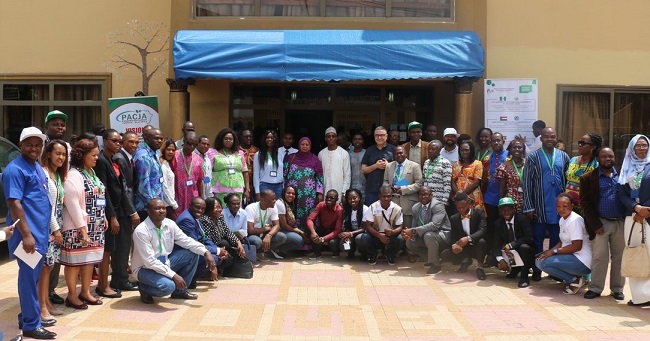The 2019 Africa Climate Week commenced on Monday, March 18 in Accra, with over 2,500 delegates gathered in the Ghanaian capital city.

During the week, ministers, policymakers, and non-Party stakeholders – from businesses to NGOs and from financial institutions to cities and academia – will be discussing ways to advance climate action.
The Africa Climate Week (ACW) started with two major events: the Africa NDC Dialogue and the Africa Regional Consultative Workshop on REDD+. But are holding from March 18 to 19.
The Africa NDC Dialogue analyses the outcomes of COP24 and discuss the implementation of national climate plans, known as “Nationally Determined Contributions” or “NDCs”. The discussion focuses on the existing gap between the current climate action pledges of governments and the Paris Agreement’s long-term goal of limiting the global average temperature rise to as close as possible to 1.5 degrees Celsius. Delegates are discussing ways of raising national, regional, and global ambition towards achieving that goal.
Africa Regional Consultative Workshop on REDD+ is holding courtesy of the Pan African Climate Justice Alliance (PACJA), Forest Carbon Partnership Facility (FCPF) and the Mainyoito Pastoralist Integrated Development Organisation (MPIDO).
PACJA and MPIDO are recipient organisations / World Bank Intermidiaries for additional finance extension of the Pan African FCPF Capacity Building Programme on REDD+ for CSOs and forest dependent indigenous peoples (IPs) supported by the FCPF through the World Bank.
The project is geared towards strengthening the knowledge of African civil societies, local communities, and forest dependent IPs from 18 FCPF countries in order to facilitate their active engagement and meaningful participation in the national REDD+ process.
Besides broadening conversation around the FCPF capacity building programme and strengthening the REDD+ community of practice among the participating FCPF countries, the workshop is also aimed at proposing recommendations and specific action areas to inform project implementation.
Welcoming the participants to the meeting, the Executive Director of PACJA, Mithika Mwenda, decried the inertia in some governments, but appreciated innovative mechanisms that are being put in place to promote forest preservation.
He particularly pointed at the FCPF, a World Bank-funded mechanism to support forest programmes in support of the global call for action against climate change.
“It’s not enough to agree, sign and adopt the Paris Climate Agreement,” Mithika emphasised. “It is important to move beyond it and take action at local level, at communities we come from.”
“Climate Justice Movement is growing tremendously, and we see how it is being energised by young people across the world,” he said, noting that this is the only way to bequeath a better planet to the next generation.
Mithika also expressed the desire of civil society to contribute at the Africa Climate Week and share perspectives on the climate solutions and how they impact on livelihoods and environment.
Joseph Ole Simel, the Executive Director of MPIDO, reiterated the strength in the collaboration among organisations and people sharing common heritage and challenges.
“The impact of climate change is affecting the vulnerable communities we represent here and thus we need to be very proactive as we cannot be spectators anymore,” he said, adding that indigenous people in Africa will continue with such collaborative efforts until their visibility and impact is assured.
“So far we are doing very well but I think we must do more,” he noted.
Among the countries represented are Burkina Faso, Cameroon, Central African Republic, Democratic Republic of Congo, Republic of Congo, Cote d’Ivoire, Ethiopia, Gabon, Ghana, Kenya, Liberia, Madagascar, Mozambique, Nigeria, Sudan, Tanzania, Togo and Uganda.
The ACW is said to be the first major stepping stone of 2019 in the global efforts to increase climate ambition. The year, it was gathered, marks the launch of a new round of NDCs that countries are expected to submit to the UN Framework Convention on Climate Change (UNFCCC) by 2020 with the overarching objective of the world collectively achieving the goals of the Paris Agreement.
In this regard, the outcomes of the ACW will be a key contribution to the Climate Action Summit that United Nations Secretary-General António Guterres is hosting this September, the objective of which is to help raise climate ambition from governments and non-State actors.
A central moment of Africa Climate Week will be on Wednesday, March 20 when the high-level segment will take place with the presence of the President of Ghana, Nana Akufo-Addo; UN Climate Change Deputy Executive Secretary, Ovais Sarmad; Ghanaian actress and television personality, Joselyn Dumas; and COP24 President, Michał Kurtyka.
In parallel to the central programme of events, climate actors from around the region will showcase groundbreaking solutions to climate change at the Pitch Hub and Knowledge Corner, located in the heart of the International Convention Centre.
The Africa Climate Week is being co-convened by the UNFCCC secretariat (UN Climate Change), UN Environment, the West African Development Bank, UN Development Programme, World Bank Group, African Development Bank Group, and International Renewable Energy Agency, in collaboration with Climate Technology Centre & Network, UN Food and Agriculture, United Nations Economic Commission for Africa, West African Alliance, Adaptation Fund and Climate and Clean Air Coalition.
Other participating organisations include UN Global Compact, WBCSD, ICLEI, Climate Resilience Network, CDP, SLOCAT, Global Covenant of Mayors for Climate & Energy, UN-Habitat, Nature4Climate, ICC, Global ABC, CIFOR, UCLG Africa, CIAT-CCAFS, ECREEE, and UN Volunteers.
